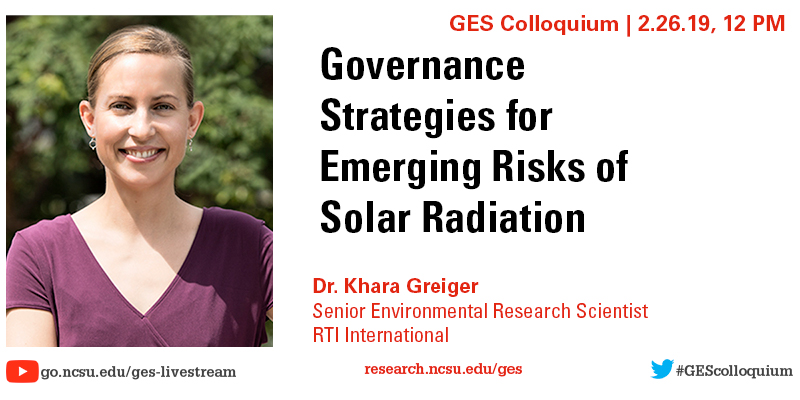
- This event has passed.
GES Colloquium | Khara Grieger – Governance Strategies for Emerging Risks of Solar Radiation Management

GES Colloquium | YouTube: LIVE STREAM
Governance Strategies for Emerging Risks of Solar Radiation Management
Speaker:
Dr. Khara Grieger, Senior Environmental Research Scientist, RTI (link)
Abstract:
Decision-makers may soon need to consider other options than mitigation and adaptation to deal with impacts from global climate change. This is in part due to recent reports that indicate we may not be able to reach the target of 1.5-2C warming soon enough to avoid serious climate change impacts. Geoengineering technologies, including solar radiation management (SRM), may be attractive as technological solutions since they could provide cost-effective strategies to reduce warming levels compared to mitigation efforts alone. However, geoengineering and SRM in particular, is characterized by deep and fundamental uncertainties regarding potential health, environmental, social, ethical, and legal impacts from development and use, with increased risks for international socio-political conflicts. In response, there have been numerous recommendations and calls for robust, proactive, and responsive governance strategies for SRM, although none of these strategies or frameworks have been fully implemented by an organization or consortia to date.
This presentation reviews the suitability of the Emerging Risk Governance guidelines proposed by the International Risk Governance (IRGC), given IRGC’s experience in risk governance of other complex and emerging technologies. Using the five steps in the Emerging Risk Governance guidelines, the state of the science and governance initiatives will be reviewed, and potential gaps and deficits highlighted. Overall, this analysis aims to contribute to the growing literature on best practices for SRM governance.
Bio:
Dr. Grieger is a Senior Environmental Research Scientist at RTI International. Her key research areas focus on strategies to understand and make decisions regarding the societal impacts of emerging risks, technologies, and products of innovation. In the past decade, she has evaluated health, environmental, and social impacts of nanotechnology and nanomaterials, and recently explored risk governance of geoengineering. She has been working with colleagues at NCSU over the past 2 years on responsible innovation of nanomaterials, and recently served as a Duke University Scholar (2018).
WordPress database error: [Unknown column 'wp_tec_occurrences.start_date' in 'SELECT']SELECT SQL_CALC_FOUND_ROWS wp_posts.*, CAST( wp_tec_occurrences.start_date AS DATETIME ) AS event_date
FROM wp_posts LEFT JOIN wp_term_relationships ON (wp_posts.ID = wp_term_relationships.object_id) LEFT JOIN wp_postmeta ON ( wp_posts.ID = wp_postmeta.post_id AND wp_postmeta.meta_key = '_EventHideFromUpcoming' ) LEFT JOIN wp_postmeta AS mt1 ON ( wp_posts.ID = mt1.post_id )
WHERE 1=1 AND wp_posts.ID NOT IN (12325) AND (
wp_term_relationships.term_taxonomy_id IN (69,70,149,591,601,617,618)
OR
wp_term_relationships.term_taxonomy_id IN (45)
) AND (
wp_postmeta.post_id IS NULL
AND
( mt1.meta_key = '_EventStartDate' AND CAST(mt1.meta_value AS DATETIME) >= '2026-03-03 15:49:19' )
) AND wp_posts.post_type IN ('post', 'page', 'attachment', 'tribe_venue', 'tribe_events', 'tribe_event_series') AND ((wp_posts.post_status = 'publish'))
GROUP BY wp_tec_occurrences.occurrence_id
ORDER BY event_date ASC, wp_posts.post_date ASC
LIMIT 0, 3